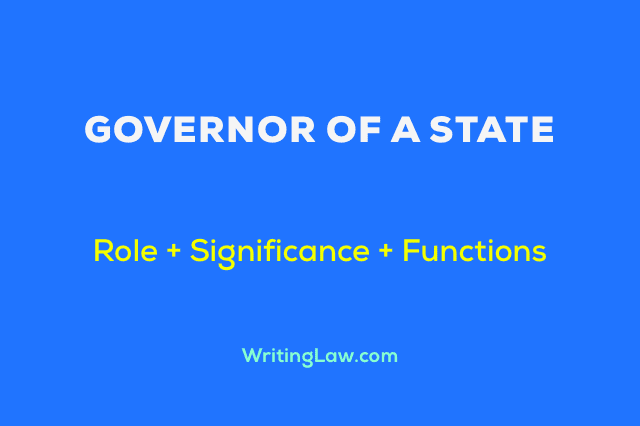
The Governor is the head of the state. He is elected by the President of India and holds office at the pleasure of the President.
Like the union, there is a parliamentary system, even at the state level. There is a need for a nominal head in a parliamentarian government, which is the President at the national level and the Governor at the state level.
Article 153 of the Indian Constitution says that there shall be a Governor for every state and all the executive powers of the state vest in the Governor. Therefore we can say that the post of Governor is a constitutional one.
What Is the Need for a Nominal Head (Governor) in a State?
- For the checks and balances in the state, it is necessary to have a head who supervises all actions of the state.
- The parliamentary system is unstable. A government formed can at any time be broken by the people of India. Hence, a head with a fixed term is required for continuity of administrative work.
- The parliamentary system is based on party politics. Therefore, a head is required who can be considered above party policies and think for the welfare of the people.
Why Is the Governor Called a Linchpin?
Linchpin means a person or thing vital to an enterprise or organization. Sarkaria Commission has stated that the Governor is a linchpin.
In India, there is a concept of cooperative federalism. The two governments, which are union and state, work collectively. They are not independent in their spheres. This is the reason that the Governor has a unique position in linking the two sets of government.
The Governor acts as a bridge between the union and the state. He has to communicate the state’s aspiration to the union as an elder brother and bring issues of national significance at the state level like a postman.
Functions of Governor
- It is the Governor of a state who appoints the chief minister of the state and the Advocate General of the state.
- The Governor possesses powers to impose the Governor’s rule or state emergency in the state on the failure of constitutional machinery in the state.
- For any state bill to become an act, the assent of the Governor to the bill is necessary.
- The Governor can summon the state legislature. He may prorogue (discontinue a session of (parliament or other legislative assemblies) without dissolving it) the session or dissolve the assembly.
- He nominates one member of the legislative council from the Anglo-Indian community.
- If the situation is of an emergent nature, he has the power to issue an ordinance in the state like that of a President.
- He also has pardoning power like that of a President. But he cannot do so if the punishment is Court Martial or death.
- The Governor also appoints judges of a high court.
What Makes the Post of Governor Controversial?
Article 163 of the Indian Constitution says that the Governor is not bound to the advice given by the council of ministers of state. He has discretionary power to consider the opinion or advice given to him. Then the question comes – ‘Is the discretionary power of the Governor absolute?‘
In Nebam Rabia vs the Union of India 2016, the Supreme Court clarified that the decisions of the Governor are not beyond the scope of judicial review. The judiciary can anytime inquire about the action of the Governor.
Should the Office of Governor Be Abolished
The report of the Punchhi Commission in 2010 stated two points. First, there should be the removal of the phrase ‘the Governor works at the pleasure of the President.’ It should be deleted from the constitution. Secondly, the Governor should be removed from his office only by resolution of the state legislature.
We derive the post of the Governor from the Government of India Act of 1935 when there was British rule in India. Now, India is a free independent nation. But because we have adopted a parliamentary form of government, there is a necessity for a nominal head at the centre as well as at the state level.
Instead, there can be reforms in his post, like in the case of appointment and removal. An eminent personality can be appointed as a Governor who doesn’t belong to that state. This will ensure a healthy administration in the office of the Governor.
Recent Scenario of Powers of Governor
In recent times, there have been many instances like of Jammu & Kashmir, where the Governor’s rule was imposed for six months. In the Karnataka assembly elections in 2018, when there was no single party present to form the government, the Governor’s role came into the limelight. The same happened in the Uttarakhand elections in 2016.
It is said that constitutional emergency should be imposed sparingly and in extreme situations where there is no way out. Imposing an emergency in a state is not a small thing but a serious concern.
Conclusion
The Sarkaria Commission, in its report, stated that the post of Governor is above politics. The office of the Governor is bestowed with the responsibility of the welfare of the state. Therefore the scope of discretionary power of the Governor is limited. The actions of the Governor must not look arbitrary.
“Governor is neither a decorative emblem nor a glorified cypher but has an important role in strengthening federalism.”
Read Next:
1. How Can India Admit and Establish New States as Per the Indian Constitution
2. What Is Anti-Defection Law as Per the Indian Constitution
3. What Are the Discretionary Powers of the President of India
- Article 334A of the Constitution of India - 14th April 2024
- Article 332A of the Constitution of India - 14th April 2024
- Article 330A of the Constitution of India - 14th April 2024







